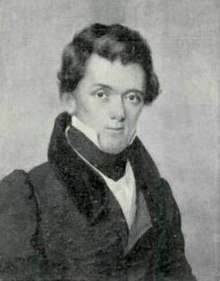Edwin P. James | |
|---|---|
 | |
| Born | August 27, 1797 Weybridge, Vermont, United States |
| Died | October 28, 1861 (aged 64) Burlington, Iowa, United States |
| Alma mater | Middlebury College |
| Spouse | Clara Rogers |
| Scientific career | |
| Fields | Botany, Geology |
| Author abbrev. (botany) | E.James |
Edwin P. James (August 27, 1797 – October 28, 1861), a 19th-century American botanist, geologist, linguist, and medical practitioner, was an important figure in the early exploration of the American West. James was also known for his time spent creating relationships with Native Americans in the United States, and also aiding African Americans to escape slavery.
James is primarily remembered for his participation in the expedition of 1820 led by Major Stephen Harriman Long, into still largely unknown territory acquired in the Louisiana Purchase. James served during the expedition's more productive second year. That expedition "was the first scientific survey of the region and dramatically increased the country’s geographical knowledge of the West."[1] James was primarily responsible for producing the report, Account of an Expedition from Pittsburgh to the Rocky Mountains, Performed in the Years 1819, 1820, published in 1823.

During the expedition, James accomplished the first recorded mountain ascent in North America to over 14,000 ft. elevation, and was the first to collect many alpine plant species, including what he called "the mountain Columbine" Aquilegia coerulea,[2] later to become the state flower of Colorado, now with the common name Colorado Blue Columbine.
The expedition's extensive collection of information on flora, fauna, geology and geography, as recounted in James' Account, is reminiscent of the efforts, just two decades earlier, by Alexander von Humboldt in Central and South America. A copy of Humboldt's Personal Narrative of Travels of the Equinocial Regions of the New Continent was carried by the Long expedition.[3]
The Account influenced the literature of the Far West. Historian William H. Goetzmann suggested "the most important literary event of 1823 was the publication of Dr. Edwin James's Account of an Expedition."[4][5] In a more recent homage to James, Lyndgaard said: "The passages that deal with landscape description, bison, and Native Americans, especially the Pawnee, were immediately recognized for their quality, and were thus mined by novelists as well as celebrated by reviewers."[6]
- ^ "American Journeys Background on Account of an Expedition from Pittsburgh to the Rocky Mountains, Performed in the Years 1819, 1820 [volume 3]".
- ^ James, Edwin (1823). Account of an expedition from Pittsburgh to the Rocky Mountains, II. p. 28.
- ^ Evans, Howard Ensign (1997). The Natural History of the Long Expedition to the Rocky Mountains, 1819-1820. New York: Oxford Univ. Press. ISBN 978-0-19-511185-9.
- ^ Goetzmann, William H. (1969). "James Fenimore Coopere: The Prairie".
- ^ Benson, Maxine, ed. (1988). From Pittsburgh to the Rocky Mountains, Major Stephen Long's Expedition 1819-1820. Golden, Colorado: Fulcrum, Inc. pp. xviii, xii. ISBN 1-55591-022-X
- ^ Lyndgaard, Kyhl (2010). "Landscapes of Removal and Resistance: Edwin James's Nineteenth-Century Cross-Cultural Collaborations". Great Plains Quarterly (Winter): 37–52.